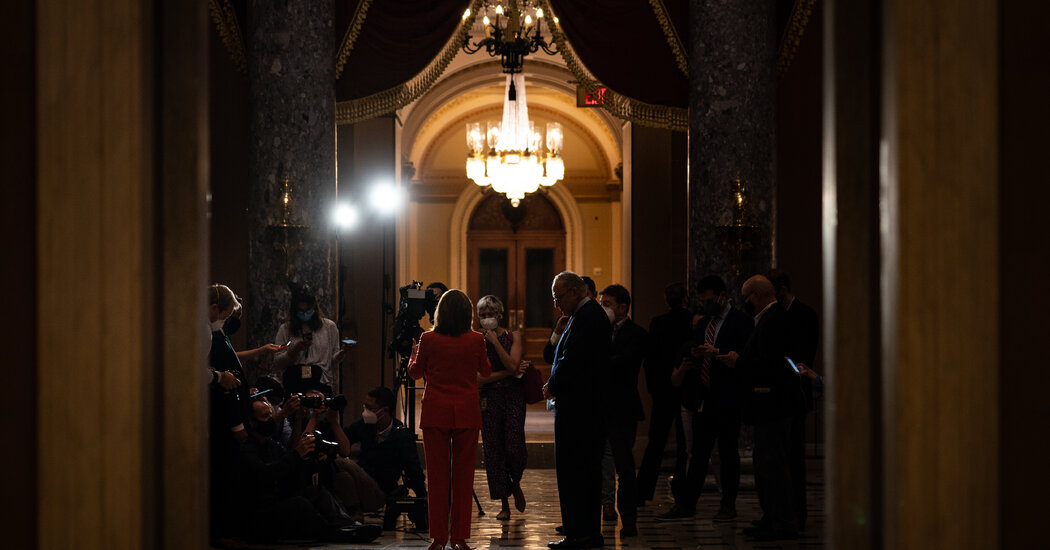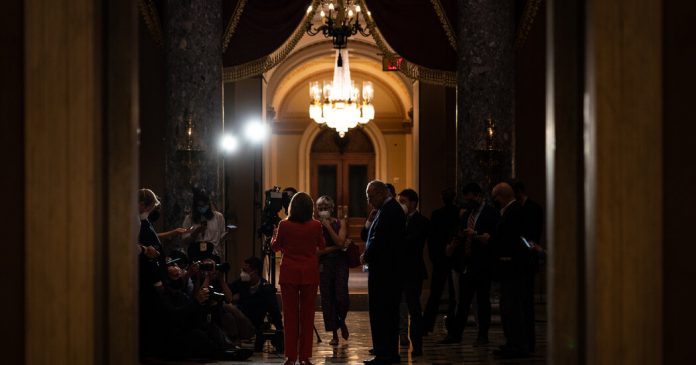
WASHINGTON — The White House and congressional Democrats on Tuesday crept toward an elusive compromise on an economic recovery plan, agreeing to an end-of-the-week deadline to seal a deal that would restore expired jobless aid for tens of millions of Americans even as they remained far apart on the contours of the package.
In a sign that Republicans may be willing to offer a major concession amid deep divisions in their ranks about supporting any additional federal relief, Senator Mitch McConnell, Republican of Kentucky and the majority leader, signaled that he might be willing to accept the extension of $600-per-week unemployment payments — something many in his party oppose — if it would yield a compromise.
Later, after a meeting with Mark Meadows, the White House chief of staff, and Steven Mnuchin, the Treasury secretary, top Democrats indicated there had been progress toward a potential deal.
“They made some concessions, which we appreciated; we made some concessions, which they appreciated,” Senator Chuck Schumer of New York, the Democratic leader, said after the 90-minute meeting, which Speaker Nancy Pelosi of California hosted in her Capitol Hill suite. “We’re still far away on a lot of the important issues, but we’re continuing to go at it.”
The apparent movement came as talks on the latest round of federal pandemic relief were reaching a crisis point on Capitol Hill, with the unemployment payments already expired, the looming lapse at week’s end of a popular small-business loan program that has kept many businesses afloat, and the Senate set to start its summer recess on Friday.
A number of significant policy differences remain, and officials involved in the negotiations cautioned that there was little time to meet their agreed-upon timeline for a final deal, which would pave the way for votes on the package next week. Even if they were able to do so and President Trump signed a recovery bill by the end of next week, it could take weeks for tens of millions of workers to begin receiving the supplemental benefits again.
It was unclear what concessions either side made in the meeting, though Mr. Mnuchin said he and Mr. Meadows had proposed an agreement to revive and extend a federal eviction moratorium through the end of the year. Republicans omitted the measure from their $1 trillion relief package, but Mr. Trump has said it was a top priority.
“We’re going to work around the clock the next few days to see if we can bridge the issues,” Mr. Mnuchin said. “Some issues we’ve been able to agree on, some significant issues are still open.”
The terms of the eviction moratorium remains unresolved, however, because the offer did not include additional assistance for homeowners and renters of the kind included in the Democrats’ $3 trillion plan, according to two people familiar with the negotiations, who asked to speak on the condition of anonymity to disclose details of a private meeting.
“We know that the devil is in the details — so are the angels,” Ms. Pelosi said after the session with the administration officials and Mr. Schumer.
The four plan to reconvene on Wednesday to continue talks.
At the White House, Mr. Trump continued to dangle the possibility that he could circumvent Congress and take executive action to try to halt evictions nationwide and to suspend the payroll tax, an idea that Republicans dropped from their proposal amid wide opposition. Mr. Meadows said that remained a possibility, though he added that he hoped the negotiations would produce a deal that would make such action unnecessary.
It is far from clear that the president has the power to make either move unilaterally, but his deputies appeared to be using the possibility as a negotiating tactic with Democrats and to simply get around the objections within Mr. Trump’s own party on the payroll tax issue.
“We want to take care of the eviction problem,” the president said Tuesday during a briefing at the White House. “People are being evicted unfairly. It’s not their fault. It’s China’s fault.”
He noted that there was progress being made on Capitol Hill, but continued to attack Democrats even as his top advisers were seeking a compromise with them.
At the Capitol, Mr. McConnell conceded that many of his fellow Republicans, who are pressing to cut the jobless aid, “may not vote for a package” if it includes Democrats’ demand to extend the $600 weekly benefit through year’s end. But, in a nod to the economic and political stakes of the negotiations, which are unfolding three months before a general election, he said Congress had no choice but to push through an aid measure.
“The American people, in the end, need help, and wherever this thing settles between the president of the United States and his team that has to sign it into law, and the Democrat not-insignificant minority in the Senate and majority in the House is something I am prepared to support — even if I have some problems with certain parts of it,” Mr. McConnell said.
The halting progress came as Senate Republicans, who have not yet acted on a relief package and have not been a part of the negotiations with Democrats, appeared to be losing patience with the process as the clock ticked down to their scheduled summer recess.
“How do you think it looks for us to be back home when this is unresolved?” Senator John Cornyn, Republican of Texas, who is facing re-election, told reporters. “This is the most important thing we need to be doing.”
Senator Lisa Murkowski, Republican of Alaska, said she had begun to reach out to individual Democrats to see if rank-and-file lawmakers could help facilitate a breakthrough.
“As I look to where we are, I feel the same discouragement, despair — despair that we’re here on the fourth of August,” she said. “We don’t have answers for people right now. So, we’re going to keep working.”
Senator Marco Rubio, Republican of Florida, noted that even as the chamber had failed to find a way to act on major legislation like the recovery bill, Mr. McConnell had kept up a steady pace of judicial confirmations.
“We’re going to have to move toward each other to get something done,” Mr. Rubio said.
“At some point,” he added, chuckling, “we run out of judges.”
Jim Tankersley contributed reporting.
The post Trading Concessions on Recovery Plan, Negotiators Set Week’s End Deadline for a Deal appeared first on New York Times.







